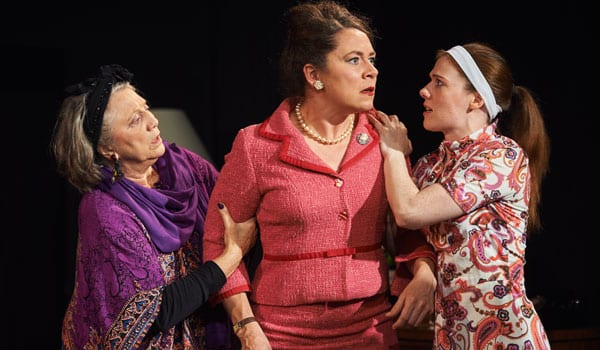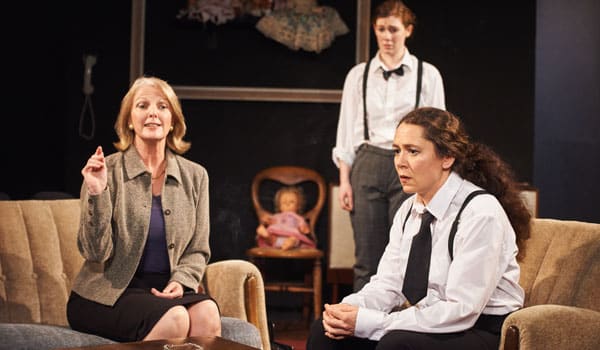
The Killing of Sister George
London Theatre Workshop
7th November
4 Stars
Anyone who thinks showbiz obsessions are a modern affair could get a shock if they went to the London Theatre Workshop this month.
The Killing of Sister George is the story of June Buckridge, an actress who plays the beloved George in Applehurst, a hit BBC radio drama that bears more than a passing resemblance to The Archers. The neurotic and psychotic actress is convinced that her character is about to be killed off and takes out her frustrations on her naïve and trusting lodger Alice. Her worst fears eventually come true, leading to a period of national grief and a deterioration in June’s mental state.
Frank Marcus’ script was written in 1965, easily discernible from the highly and florid nature of the language (it’s all very BBC RP). Despite this, the play has aged very well and the themes are just as relevant as ever; perhaps even more so. The public’s obsession with fictional characters has only intensified in the years after Marcus’ death, making him look remarkably prescient.
In addition, the BBC executive’s obsession with being contemporary is different in its application (a fictional baby born out of wedlock – shock horror) but this quest for ‘modernisation’ will not be lost on many regular BBC viewers and listeners.

The production has a Pinterseque quality to it; there are some very dark themes being wrestled with and it features some constantly changing power dynamics. There’s an ambiguous quality to many of the key character relationships; especially between June and Alice.
At times they seem to be like abusive mother and submissive daughter, at times best friends and there are even moments where it seems Alice revels in June’s clear affection for her. There is a clear sexual undercurrent between the two; the play is often held up as a depiction of lesbianism in theatre but it is only alluded to and never fully expressed.
These shifting foundations make for an unsettling experience, but the realism of the performances keeps it compelling and interesting. How fantastic to have an all-female cast, which must have seemed even more remarkable when the production first hit the stage.
My favourite performance was Sarah Shelton as the kind-hearted but inflexible BBC executive, Mrs Croft. She is the archetypal by-the-book bureaucrat, however slowly showed a softer side as the evening developed. It was a complex performance; her role as a shocked ‘outsider’ was a critical foil to keep the play within the bounds of normality.
The relationship between June and Alice is an important one and both parts were extremely well played. Sioned Jones as June was suitably maniacal, capable of being both charming and unbelievably cruel (as most psychopath are). She also managed to wrestle some audience sympathy from a fairly gruesome character; the final scene (a true ‘they can’t end it there can they?’) was both sad and touching.

Briony Rawle was superb as the tender and naïve Alice; struggling in an abusive domestic relationship. It was a wonderfully expressive performance; you could feel her pain and desperation to escape. Janet Amsden also added some much-needed comic relief as the eccentric fortune teller Madam Xenia.
The Killing of Sister George is a play that feels ripe for a revival; the cast and crew have certainly done it justice. It’s high quality theatre that will certainly make you think about the true impact of fame and celebrity.
The Killing Of Sister George is playing at the London Theatre Workshop until 21 November 2015
